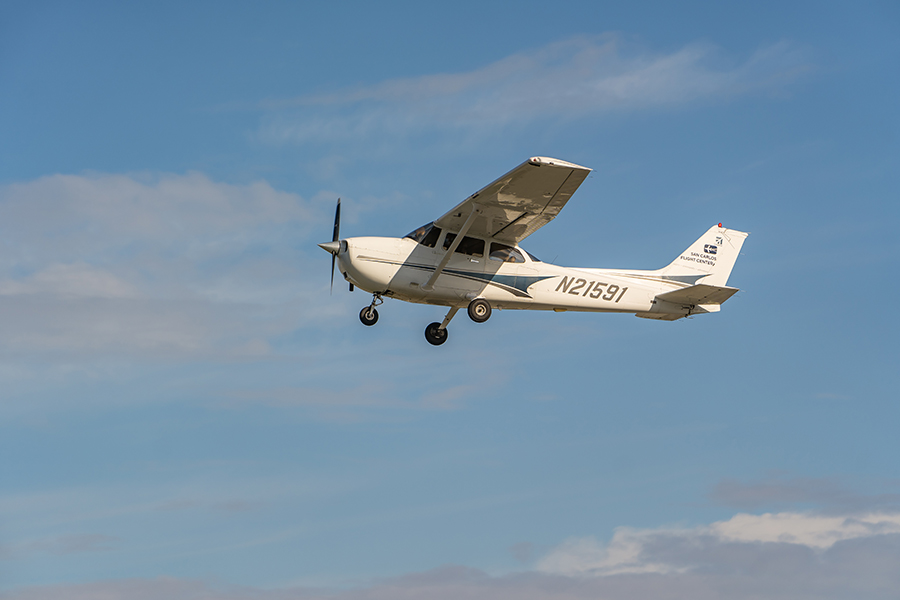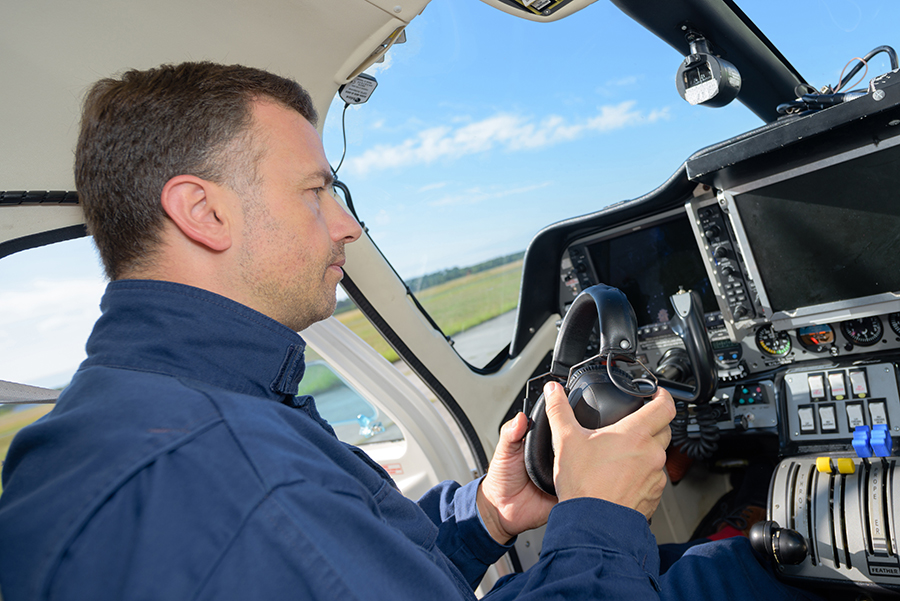-
The Psychological Challenges Facing Pilots
-
Understanding Stress and Its Impact on Pilots
-
How Stress Affects Decision Making in the Air
-
Developing Stress Management Strategies for Pilots
-
Enhancing Pilot Decision Making Skills Through Training
-
Tips for Making Sound Decisions Under Pressure
-
Importance of Mental Resilience and Preparation for Pilots
-
Resources for Managing Aviation Stress and Anxiety
-
FAQs: Decision Making in the Air
-
Conclusion
-
About Ben Lovegrove
You’re sitting in the cockpit, running through pre-flight checks. The weather is looking dicey, and ATC just announced delays. Your copilot called in sick. Stress starts creeping in as you mentally prepare for the flight ahead. Staying calm and making the right choices in moments like these are key to a safe flight. In this article, we’ll explore the psychological pressures pilots face and provide tips to master stress management and decision-making while flying. You’ll learn how to maintain focus when the heat is on and land smoothly despite any turbulence along the way.
The Psychological Challenges Facing Pilots
Flying an aircraft requires mental demands that can take a toll on even the most seasoned aviators. As pilots, we must navigate high-pressure situations where stress runs high, and split-second decisions carry major consequences. Though exhilarating, this environment poses very real psychological challenges.
- Information overload. The cockpit is full of instruments, gauges, and alerts vying for attention. Processing this firehose of data taxes our working memory and can lead to tunnel vision or analysis paralysis. Information management is a constant challenge.
- Fatigue. Long duty days, irregular schedules, and crossing time zones inevitably induce mental and physical exhaustion. Fatigue impairs cognitive skills like reaction time, memory, and vigilance that are critical for safe piloting.
- Isolation. Flying solo for hours on end can be mentally grueling. We must maintain focus and motivation without social interaction or sensory stimulation. Boredom and loneliness take a toll.
- Emergencies. In-flight emergencies trigger our fight or flight response, flooding us with stress hormones. While this can sharpen our reflexes, it can also cloud thinking and judgment when they’re needed most. Staying calm under pressure is difficult.
- Automation dependence. Over-reliance on autopilot dulls our hand-flying skills and situational awareness. But taking back manual control can spike anxiety and workloads. Maintaining the right balance is tricky.
Mastering the mental game is just as important as honing technical skills for pilots. Understanding these psychological stressors is the first step to developing resilience and adapting to aviation’s unique demands. With knowledge, preparation and training, we can thrive in environments that stretch the limits of our minds.
Understanding Stress and Its Impact on Pilots
- Pilots face immense pressure and stress daily. From changing weather and technical malfunctions to high workloads and time pressures, flying requires unwavering focus and quick decision-making in stressful situations.
- According to aviation psychologists, stress affects individuals in different ways. Positive stress or “eustress” can enhance function, while excessive stress or “distress” can impair performance.
- Major sources of distress for pilots include:
- Environmental factors – weather changes, turbulence, high altitudes
- Technical problems – system failures, instrument or control malfunctions
- Operational pressures – high workload, time constraints, distractions
- Personal issues – fatigue, health concerns, financial or family problems
- When under stress, the body releases hormones like adrenaline and cortisol. This speeds heart rate, tenses muscles, and clouds thinking – the opposite of what pilots need.
- Studies show chronic stress contributes to anxiety, depression, fatigue and poor concentration in pilots. It degrades cognitive skills like working memory, situational awareness, and analytical thinking.
- Stress narrows attention, fuels tunnel vision, and leads to hasty decisions based on incomplete data. Pilots may fixate on one aspect of a problem, failing to scan instruments or consider alternatives.
- Performance suffers. Stress reduces coordination, often resulting in erratic maneuvers or improper control inputs. Pilots may forget vital steps in emergency procedures when anxious or overwhelmed.
- Managing stress is key to resilience, performance, and safety. With training and preparation, pilots can better control their minds and bodies during difficult situations. This enables timely, rational decision-making – a lifesaving skill all pilots must cultivate.
How Stress Affects Decision Making in the Air
- As you’ve experienced, flying can be highly stressful at times. When under stress, our brains go into “fight or flight” mode, triggering the release of hormones like adrenaline and cortisol.
- This stress response is helpful for dealing with immediate danger. But in the cockpit, high stress can cloud our thinking and negatively impact the decision-making process.
- For example, stress may lead to:
- Tunnel vision – focusing on one problem and neglecting other critical factors
- Impaired working memory – trouble retaining and processing information
- Cognitive rigidity – difficulty adapting plans or thinking flexibly
- Emotional reactivity – acting rashly based on anger, anxiety or frustration
- A classic example is a pilot fixating on a technical malfunction but forgetting to maintain control of the aircraft. Stress narrows focus, while safe flying requires broad situational awareness.
- Stress can also diminish our ability to select the optimal course of action when faced with a complex problem. We may opt for the first satisfactory option rather than considering alternatives.
- However, while excessive stress degrades decision-making, a moderate level can enhance focus and motivation. The key is managing stress within a productive range.
- With the right training and preparation, pilots can learn to make high-stakes decisions under pressure. Having the mental resilience and cognitive strategies to adapt and respond effectively, even in challenging circumstances, is an essential pilot skill.
- Understanding your stress response and learning ways to regulate thoughts, emotions and focus during stressful situations will go a long way towards supporting sound decision-making in the air.
Developing Stress Management Strategies for Pilots
Staying mentally sharp and focused in the cockpit requires proactive stress management. As a pilot, you’ll face many unavoidable stressors like weather changes, system malfunctions, and high-pressure situations. Learning to regulate your body’s response to these stress triggers is crucial. Here are some proven techniques to build your resilience:
- Practice deep breathing and relaxation. When you feel stress mounting, take a few minutes to slow your breathing. Inhale deeply through your nose, hold for 3-5 seconds, then exhale slowly. Repeat this breathing exercise while consciously relaxing your muscles.
- Adopt mental techniques like positive self-talk. Counter stressful thoughts with empowering statements like “I’ve trained for this” or “I’ll handle this one step at a time.” Visualize positive outcomes.
- Take short mental breaks during longer flights. For a few minutes, shift your attention to something unrelated like listening to upbeat music. This distraction can recharge your focus.
- Stick to inflight routines and procedures. The structure and familiarity create a sense of control and confidence.
- Stay physically active. Regular exercise and healthy habits boost mental stamina and reduce reactivity to stress.
- Debrief after challenging flights. Reflecting on lessons learned can help process emotions and build resilience for the future.
- Lean on your support network. Sharing experiences with fellow pilots who understand the demands can help relieve stress.
With the right coping strategies, you can take charge of stress before it diminishes your flying performance. Prioritize mental strength training alongside technical skills. Staying cool, calm and collected will prepare you to ace those challenging moments in the skies ahead.
Enhancing Pilot Decision Making Skills Through Training
When you’re in a stressful situation in the cockpit, having strong decision-making skills can make all the difference. The good news is that these skills can be honed through effective training.
- Take advantage of scenario-based training. Simulators allow you to immerse yourself in realistic emergency situations and practice making decisions under pressure. Debrief after each scenario to evaluate your thought process. Over time, your brain will get quicker at recognizing problems and weighing options.
- Incorporate aeronautical decision-making principles into your training. Focus on identifying risks early, considering alternative courses of action, and continuously re-evaluating as conditions change. Visualize potential problems and mentally rehearse your responses.
- Lean into your instructors’ experience. Ask about difficult judgment calls they’ve faced and what guided their choices. Their insights will sharpen your thinking.
- Study past incidents to understand how certain decisions impacted outcomes. But avoid judging pilots harshly—there are always multiple factors at play. The goal is to learn, not lay blame.
- Prioritize crew resource management skills like clear communication, task allocation, and assertiveness. Flying with others requires aligning perspectives before deciding.
- Make stress management part of your routine. Healthy eating, exercise, sleep and mindfulness will put you in the best frame of mind to make decisions.
- Trust your training. When facing an in-flight emergency, resist the urge to panic. Fall back on your knowledge and keep a cool head. With preparation, you’ll have the tools to make effective choices.
By integrating smart decision-making principles into your ongoing education, you’ll feel far more confident
and capable when faced with challenges in the cockpit. Stay sharp!
Tips for Making Sound Decisions Under Pressure
Making good decisions in the cockpit requires mental preparation and skill development. Follow these tips to enhance your decision-making abilities when facing high-stress situations:
- Stay calm and avoid rushing. Take a few deep breaths to clear your mind before evaluating options. Slow things down mentally.
- Stick to standard procedures and your training. Rely on checklists, flows, and protocols to guide your actions. Don’t skip steps.
- Boost your memory by using aviation acronyms like atomatoflames and grabcard.
- Be decisive but flexible. Make a choice and act on it, but be ready to quickly reassess if conditions change. Avoid analysis paralysis.
- Communicate clearly with your crew. Verbalize your thought process and listen to their input. Two heads are better than one.
- Consider the big picture. View each decision in terms of overall desired outcomes, not just immediate knee-jerk reactions.
- Learn from experience. Reflect after each flight on your decision-making. Note lessons learned.
- Stay mentally sharp. Get adequate rest, stay hydrated, eat healthy foods, and exercise regularly. A fit mind aids decision-making.
- Practice scenarios. Use simulations and mental imagery to practice emergency decision-making. Develop cognitive reflexes.
- Trust your training. When in doubt, fall back on your skills and knowledge. Don’t second guess your abilities under duress.
- Stay focused on the present. Don’t dwell on past mistakes or fixate on future uncertainties. Focus on the here and now.
With preparation and practice, you can develop the mental reflexes needed to make sound decisions under pressure. Stay in the moment, trust your training, and make choices that align with your desired outcomes.
Importance of Mental Resilience and Preparation for Pilots
Flying an aircraft comes with immense responsibility. As pilots, it’s crucial we cultivate resilience to handle stressful situations and make sound decisions under pressure. Here are some key reasons why mental toughness and preparation are vital in aviation:
- Managing stress keeps your mind sharp. Flying demands your full attention – any lapse can have serious consequences. Learning to regulate your stress response through techniques like mindfulness or positive self-talk helps you stay focused on the task at hand.
- Decision-making saves lives. In emergencies, quick thinking and judgment can avert disaster. But stress impairs cognitive functions. Building resilience through regular practice in simulators prepares you to make rational choices when it matters most.
- Confidence inspires confidence. Exuding a calm presence rubs off on passengers and crew, preventing panic. Having the mental fortitude to handle challenges builds self-assurance to lead others through crises.
- Complacency kills. Ongoing training and evaluating your abilities counteracts overconfidence. Maintaining realistic humility about your limits and proactively addressing weaknesses could one day save the aircraft.
- Fatigue diminishes alertness. Managing your energy levels through proper rest, diet and exercise sustains cognitive stamina over long flights. A tired mind leads to errors – developing resilience maximizes your vigilance.
In aviation, the human factor contributes to most accidents. By regularly strengthening your mental capacities, you ready yourself to operate optimally despite stressors. Staying psychologically fit is as crucial as physical health for pilots. Make resilience a lifelong practice and take pride in your growth.
Resources for Managing Aviation Stress and Anxiety
- Realize you’re not alone. Many pilots at all levels deal with stress and anxiety at times. Seek out communities of fellow aviators who understand the challenges you face.
- Lean on your flight instructor or an experienced mentor pilot. Their guidance can be invaluable in developing constructive ways to handle stress. Debrief after stressful flights to gain perspective.
- Stay on top of your overall health. Eat nutritious foods, exercise regularly, get enough sleep, and take time to unwind. Managing lifestyle factors helps regulate stress hormones.
- Make time for hobbies, relationships and activities you enjoy outside of flying. These serve as healthy distractions to give your mind a break.
- Try relaxation techniques like deep breathing, meditation or light yoga. Even 5-10 minutes of daily practice can boost resilience to stress over time.
- Avoid unhelpful coping strategies like drinking alcohol excessively or isolating yourself. These tend to exacerbate anxiety and depression.
- Seek professional help if needed. Many pilots benefit from working with a therapist trained in aviation psychology. Getting support is a sign of strength.
- Simulator training is invaluable for building confidence. Practice emergency procedures repeatedly to ingrain responses and minimize self-doubt.
- Review past flights objectively to identify areas for improvement. Reflect on positive learning experiences rather than dwelling on mistakes.
Remember, some anxiety is normal when flying challenging aircraft or conditions. But with the right mindset and support resources, you can take control of stress and become an even better pilot.
FAQs: Decision Making in the Air
Making sound decisions in the air can feel like a daunting task, especially when under stress or facing an emergency. Here are some frequently asked questions to help you enhance your decision-making skills as a pilot:
- How can I tell if a decision needs to be made quickly or if I have time?
- Assess the urgency and risk factors. If there is immediate danger, act right away. But smaller issues may allow time to weigh options. Don’t rush non-critical decisions.
- What if I’m not 100% sure about the best choice?
- Go with your gut if a quick judgment is needed. For other situations, consider pros/cons of the likely options. It’s okay not to be completely certain.
- How do I avoid fixating on one possible solution?
- Consciously list other options before committing. A different perspective can reveal alternatives missed initially.
- What are strategies for managing stress while deciding?
- Slow down and focus on breathing. Declutter your mind. And visualize positive outcomes, not just worst case scenarios.
- How can I become more decisive with experience?
- Reflect on past decisions to learn from both successes and mistakes. Also, keep practicing making deliberate choices.
- When should I involve others in the decision process?
- If time permits, get a second opinion or input from those impacted. But don’t become over-reliant on consensus.
With preparation and self-awareness, pilots can trust their judgment in the air. Focus on making the best decision for the situation rather than a perfect one.
Conclusion
You’ve got this. While flying can be stressful at times, remember that preparation is power. By focusing on your mental and physical health, honing your decision-making abilities through ongoing training, and employing stress management techniques that work for you, you can take on any challenges the sky throws your way. We all have moments of doubt, but your skills, experience and quick thinking will pull you through even the toughest situations. Stay cool, stay confident, and enjoy the ride. This is what you were born to do. Now go out there, slip those surly bonds of earth, and touch the face of God. Fly safe.
About Ben Lovegrove
Ben blogs about aviation, aircraft, airlines, air travel, tourism, aerospace, Urban Air Mobility (UAM), UAP/UFO, and various other related or obscure subjects. He had his first air experience in 1966, a ride in a Bell 47D helicopter. In the 1980s, he learned to fly and acquired a UK PPL. In 1990, he obtained a City & Guild Certificate in Aviation Studies at Farnborough Technical College. In 2013, Ben began reselling, flying, and blogging about drones. He is a volunteer director for the Daedalus Aviation & Heritage Group based at Solent Airport (EGHF). His blog is Aviate, Navigate, Communicate.



